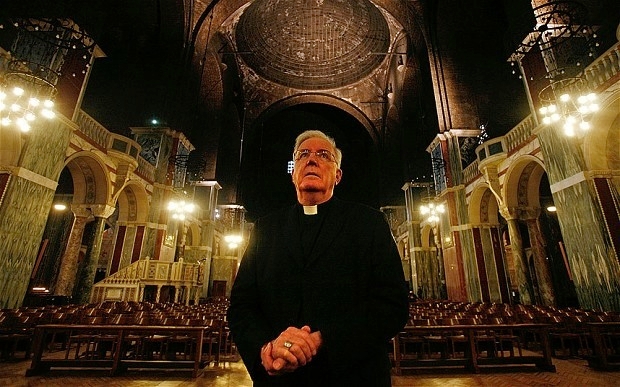A couple of days ago John Bingham, the excellent religious affairs editor of the Telegraph, broke a story that is only now filtering out. I hope he’ll forgive me if I wonder whether he realised just what a big story it was. Bingham wrote:
Cardinal Cormac Murphy-O’Connor, the former leader of the Roman Catholic Church in England and Wales, helped to orchestrate a behind-the-scenes lobbying campaign which led to the election of Pope Francis, a new biography claims … [The book] to be published next month, discloses that there had been a discreet, but highly organised, campaign by a small group of European cardinals in support of Cardinal Bergoglio.
The Great Reformer, by the British Catholic writer Austen Ivereigh, nicknames the group ‘Team Bergoglio’ and says members toured private dinners and other gatherings of cardinals in the days before the conclave, quietly putting their case.
‘Spotting their moment, the initiative was now seized by the European reformers who in 2005 had pushed for Bergoglio,’ Mr Ivereigh, who once served as Cardinal Murphy-O’Connor’s press secretary, explains in the book.
He wrote that Cardinal Murphy-O’Connor, then 80 and no longer with a vote in the conclave, teamed up with the German cardinal Walter Kasper, whose controversial call for remarried divorcees to be allowed to receive communion was one of the main points of division at the synod that Pope Francis held in Rome this year.
Cardinal Murphy-O’Connor’s role included lobbying his North American counterparts as well as acting as a link for those from Commonwealth countries.
‘They had learnt their lessons from 2005,’ Mr Ivereigh explains. “They first secured Bergoglio’s assent. Asked if he was willing, he said that he believed that at this time of crisis for the Church no cardinal could refuse if asked.
‘Murphy-O’Connor knowingly warned him to “be careful”, and that it was his turn now, and was told “capisco” – “I understand”.
‘Then they got to work, touring the cardinals’ dinners to promote their man, arguing that his age – 76 – should no longer be considered an obstacle, given that popes could resign. Having understood from 2005 the dynamics of a conclave, they knew that votes travelled to those who made a strong showing out of the gate.’
All papal elections are accompanied by lobbying: Ratzinger’s friends would have been discreetly sounding out supporters before the 2005 conclave. But organised lobbying of the type that Ivereigh alleges took place is dangerous, because it is strongly discouraged by the Church’s rules. Dr Ivereigh, as he likes to be known, is a friend of Cardinal Cormac and an enormous admirer of Pope Francis. He also helps run a self-important outfit called Catholic Voices which seeks to fill the vacuum created by the useless Catholic Media Office. So his naivety in recounting this story – which may or may not be true – is quite astounding.
Cardinal Murphy-O’Connor responded with a letter to the Telegraph written by his press secretary, Maggie Doherty. She said:
Cardinal Murphy-O’Connor would like to dispel any misunderstanding arising from Austen Ivereigh’s book on Pope Francis. He would like to make it clear that no approach to the then Cardinal Bergoglio in the days before the Conclave was made by him or, as far as he knows, by any other cardinal to seek his assent to becoming a candidate for the papacy.
What occurred during the Conclave, which did not include Cardinal Murphy-O’Connor because he is over 80, is bound by secrecy.
The letter is brief, carefully worded yet distinctly vague (‘in the days before the Conclave’). And it has been seized on by some of Francis’s enemies, who claim that any collusion between cardinals would invalidate his election. That’s just silly, in my opinion. But one blog, ‘From Rome’, is very worked up about the Telegraph story and quotes from Pope John Paul II’s sternly worded Apostolic Constitution of 1996:
The Cardinal electors shall further abstain from any form of pact, agreement, promise or other commitment of any kind which could oblige them to give or deny their vote to a person or persons. If this were in fact done, even under oath, I decree that such a commitment shall be null and void and that no one shall be bound to observe it; and I hereby impose the penalty of excommunication latae sententiae upon those who violate this prohibition. It is not my intention however to forbid, during the period in which the See is vacant, the exchange of views concerning the election.
I likewise forbid the Cardinals before the election to enter into any stipulations, committing themselves of common accord to a certain course of action should one of them be elevated to the Pontificate. These promises too, should any in fact be made, even under oath, I also declare null and void.
I am not suggesting that Cardinal Murphy-O’Connor was in breach of that constitution. But Ivereigh’s account cries out for misinterpretation, shall we say.
Also, his claim that Murphy-O’Connor ‘teamed up’ with Cardinal Kasper to secure Francis’s election will be seized on by conservative Catholics who are still wondering why so divisive a figure as Kasper was allowed to set the agenda for the Synod on the Family last month. That agenda – which included Communion for divorcees (Kasper’s pet cause) and recognition of gay relationships – outraged conservative Africans. Yesterday, in what appeared to be an act of damage limitation, the Pope appointed the very conservative Cardinal Robert Sarah of Guinea to the post of Prefect of the Congregation for Divine Worship (read Fr Alexander Lucie-Smith’s Catholic Herald blog post about him here). Now, thanks to Ivereigh, he has some more damage to limit.







Comments